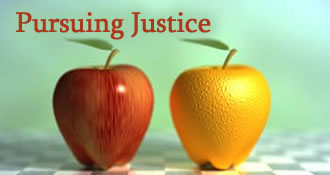
When I was about fifteen years old, my grandfather came to me and said, "Avi"-that was my name in those days-"Avi, you have to understand that our family is not without its blemishes."
I asked, "What do you mean?" I always thought of my grandfather as a wonderful man.
He explained: "In the late 1930s and the early 1940s, I filed false affidavits. I lived in Williamsburg, and I filed false affidavits about people I wanted to bring into America, to save them from the Holocaust." He continued, "I went around and I invented synagogues. I wrote letters with affidavits saying that this synagogue-which was just a basement somewhere next door-needed a rabbi, needed a cantor, it needed a secretary, it needed everybody!"
He managed to get 30 or 40 people out of Europe: cantors who couldn't sing, secretaries who couldn't organize, rabbis who weren't rabbis. But they were Jews, and they needed to be saved.
To me, my grandfather's action personifies the Torah's teaching of "Justice, justice, you shall pursue."1 It doesn't say justice you shall simply apply, but tirdofe, you must chase after justice.
About 15 or 20 years ago, I had the chutzpah-in the worst sense of the word-to write an arrogant letter to the Lubavitcher Rebbe. I had read in the newspaper that the Lubavitch movement was honoring Jesse Helms, and there was no man in America I despised more than Jesse Helms. As chairman of the Senate Foreign Relations Committee, he absolutely stood for everything that I was opposed to in those days, including being strongly anti-Israel.
I wrote a letter saying, in essence, "How can you honor a man who stands for everything that is opposed to Jewish values in America?" And I received a letter back from the Rebbe, a very, very respectful letter; a letter that I cherish for its content. And he lectured me, but in the nicest way, telling me that you never give up on anybody. You never, ever give up on somebody. Today Jesse Helms may be against Israel, but tomorrow, if we know how to approach him and speak to him, maybe he will turn out to be a champion of Israel. And I have to tell you, I had my doubts about it, but as they say, the rest is history. Although I still disagree with Jesse Helms on many issues, when it comes to Israel, he has become our champion.
I believe that he became a champion of Israel because the Lubavitcher Rebbe understood something that most of us didn't understand: how to communicate with people of different backgrounds and cultures and how to explain to them the true meaning of justice.
I think that the Lubavitch movement has learned to chase after people who don't understand and teach them about tzedek, about true justice. Lubavitch has the ability to appeal to every Jew-whether he is learning the Talmud or becoming the leader of a radical organization-and to make that person understand what he or she owes his or her Jewish heritage.
We need to learn from the Rebbe's message.
There is a story about a shul, a synagogue, that moved from an urban area to the suburbs and employed a new rabbi, as the old Rebbe stayed in the middle of town. The first time the new rabbi led the prayers, when the congregation reached Shema Yisroel, half of them stood up and half of them sat down. So the half that stood up screamed at the half that sat down, and the half that sat down screamed at the half that stood up. "Stand up!" "Sit down!" The rabbi suggested that they go to the old Rebbe and ask what the tradition of the congregation was. So after Shabbat they went to the old Rebbe, and the "sit-down" group asked, "Is it not the tradition to sit down for Shema Yisroel?"
The Rebbe responded, "No, my children, that is not the tradition."
So the "stand-up" group said, "Aha, the tradition must be to stand up!"
The Rebbe said, "No, that is not the tradition."
"Well," said the rabbi, "it is ridiculous for half of them to sit down and half of them to stand up."
The Rebbe answered, "Yes, my son, that is the tradition."
I once told that story and my mother said, "But at least they all say the Shema!"
Of course, that is the real tradition, and that is what we emphasize. There are differences. We don't focus on the differences. We focus on what we have in common.

